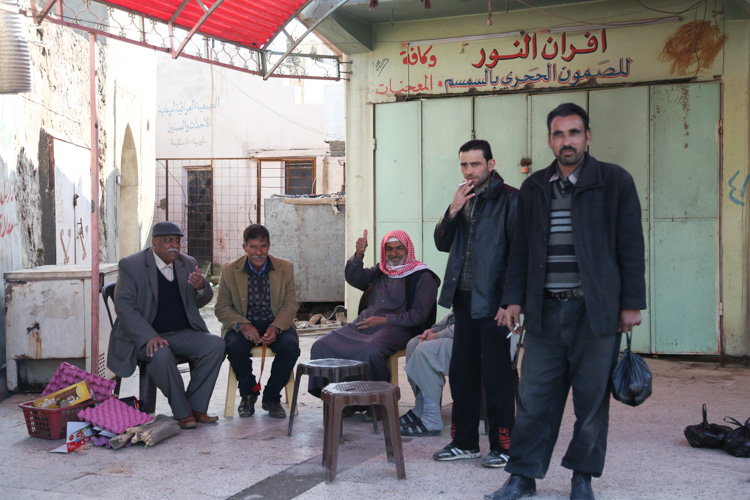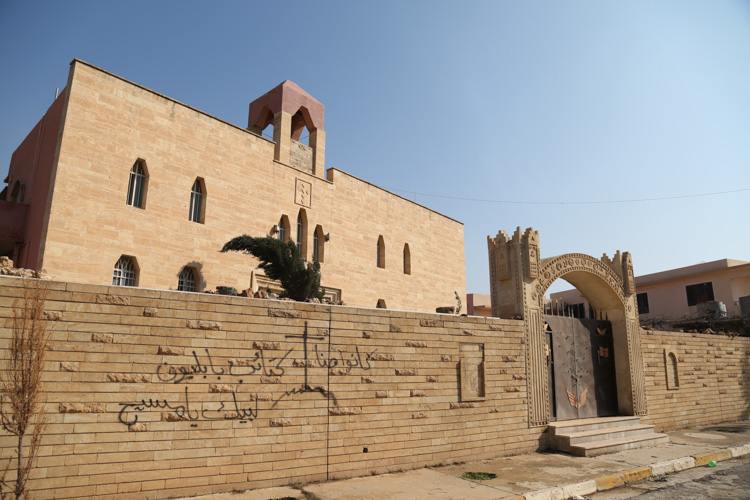Fear and Renewal; A Town is Liberated from ISIS
February 22, 2017
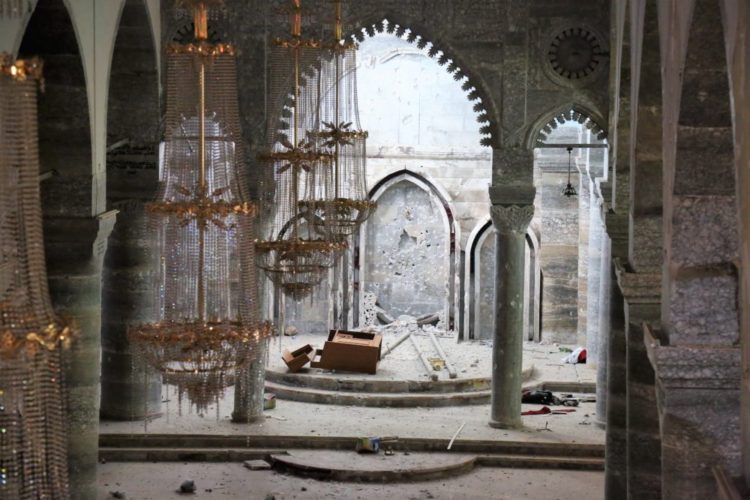
ISIS is Gone but the Fear Remains; Uncounted Casualties
Tel Keppe, a town just north of Mosul, was liberated from ISIS on 19 January 2017. Some of the FBR team was at the front, treating soldiers as they got injured, while others set up with the medical team to treat patients as they were evacuated. January 19th was a good day: there were only two wounded soldiers as the bulk of the ISIS fighters fled instead of fighting. The day following the battle we could walk around the town and talk to the people still there, who gradually increased in number as the day went on, and it became more and more clear that ISIS really was gone.
Tel Keppe was formerly a town with about 3000 families, including 500 Christian families. The day after liberation day, we were told that 700 families remained and very few Christians. For these people, as for much of ISIS-held Iraq, the day their world changed was August 2nd, 2014. January 20th, 2017, was the beginning of an uncertain future in Tel Keppe and caution was more apparent than jubilation in the mostly empty streets. But it was also a day of new freedom, and children were eager to say hi, to say thank-you, to take pictures and to show us around, including leading us to caches of mortars left by ISIS.
We will remember the woman at the church. She came after the bell was rung by the enraged man, a Christian soldier who came to the town to provide security for returning Christians – he was in military uniform and wore a big crucifix around his neck. He stood in front of the gutted church and screamed his anger at its desecration. He stomped through, up the stairs to the bell and yanked the cord vigorously, yelling some more. As the bell rang out, children gathered curiously. We snapped pictures from the roof then went downstairs. The woman stood by the door to the main sanctuary. She looked nervous, compulsively moving her scarf to cover her face, then letting it go. Her dark eyes moved rapidly from face to face as we approached her and she put on an ingratiating half-smile. Our translator helped us learn that she was Christian, and her husband had gone crazy from the pressure of living under ISIS. The explanation was long – it was important to her that we knew how difficult it had been.
Another group had shown up at the church, a leader from Mosul, in a convoy and with a retinue of personal security carrying AKs, Iraqi Army security, the press with big cameras and clutching microphones – they noticed our conversation and came over. They surrounded us in a loud, pushing group of men, trying to ask her questions and get some sort of photo-op. The scarf came back up over her face, she tried to back away but was surrounded. Her eyes were wide as they flitted from face to face. One of our female Rangers took her hand to say a prayer, trying to shield her from the pushing; as the prayer finished, the woman pulled away and tried to escape the group. But they cornered her, questioning and jostling for a few more minutes before she could slip away and flee back to the obscurity that had been her protection for the last two years.
Why will the memory of her stick? Because of her fear – it was a part of her being – no, it had become a part of her being. It was no longer just a response, or an emotion; it was the air she breathed. She is one of the uncountable intangible casualties of ISIS. As we pray for the people here, please remember these casualties too.
Post-Liberation: Life starts again in Tel Keppe
The Iraqi Army entered Tel Keppe on the 19th of January. The operation started before 9am, and by the end of the day the city was free from ISIS control. The people that were unable or unwilling to flee from ISIS when they came remained in the town for the last two years. Life was not easy.
The days following Tel Keppe’s liberation demonstrate the change that occurs in absence of oppression. On the 20th some of the people that had remained began to emerge from their homes, weary after the fighting the day before. Children could be seen, yet most would not stray far from their homes and parents. Military tanks and humvees remained on many avenues and intersections. Hashi Shabi, a Christian militia group that mostly operates around Mosul, entered the city. They came to provide security for Christians that wished to return to Tel Keppe, a town that once had almost 2000 Christians. All but a few had fled when ISIS came.
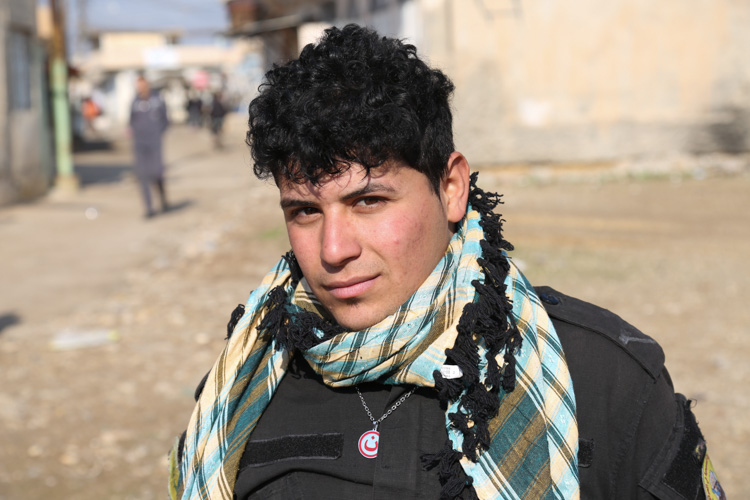
The next day children could be seen playing in groups away from home and exploring their neighborhoods. The children would smile and wave at the rangers as they walked the streets and documented the scenes of fighting from the days before. On the 22nd civilian vehicles began to enter the town from the north; a taxi car among them. Many people would visit their homes and find it had been burglarized or destroyed. The vehicles would congregate in a parking area in the North of the city and people would talk about their experience of being displaced and share their stories.
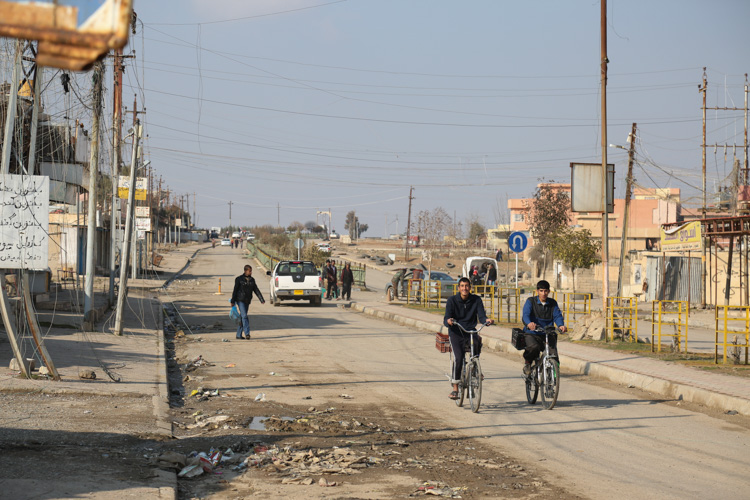
The first signs of an active community returned on the 23rd. Personal vehicles would pass by every few minutes, some with the white flag of peace blowing in the wind. People could be seen walking around most roads and in the center of town a market was beginning to emerge. Two stores were open selling children’s clothes and household items. Nearby, a few street vendors sold chicken, eggs, tomatoes and homemade yogurt. On the side of the road a group of older men sat in a circle and drank tea and smoked cigarettes; smoking cigarettes was a punishable offense under ISIS. They sat together and observed their town begin to return to normal.
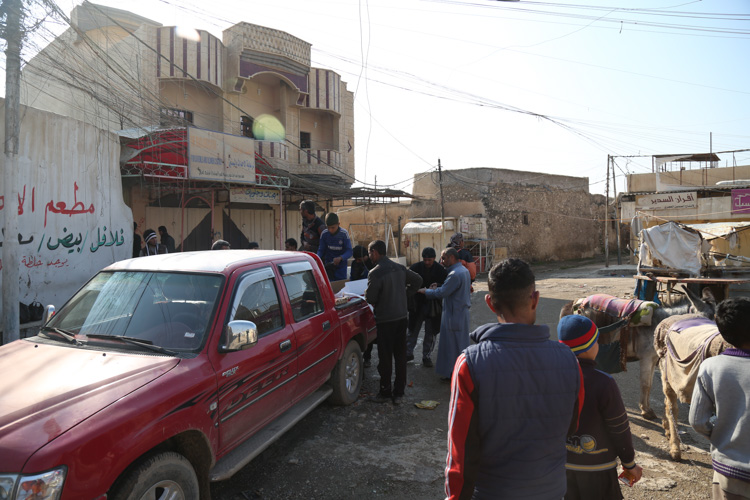
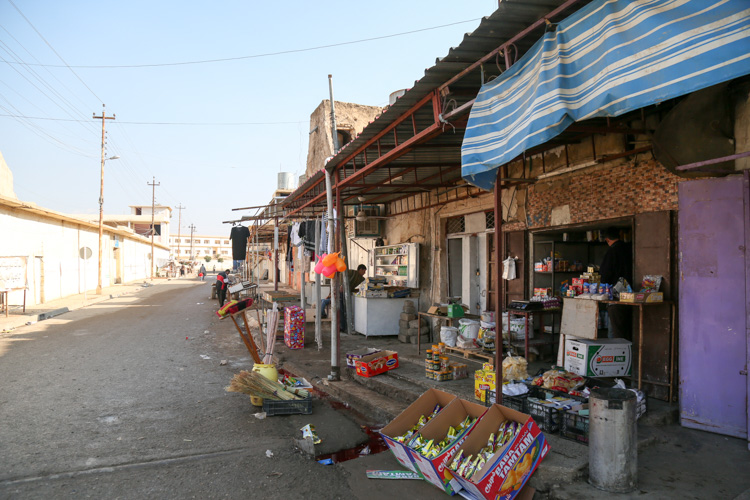
North of the market at the Qalib yaso’a Church (Jesus heart Church) someone had recently spray painted in Arabic (translated as) “The Christians from Babylon were here. Praise Jesus!”. Christians had returned. When the rangers entered the church they found two Christian men walking around, observing the piles of bibles that were burnt by ISIS. The men had fled with their families to Kurdistan when ISIS had come. They said they came back to see what had happened to their homes, but that they would leave the town again. They were not yet ready to bring their families to the town as it was still too dangerous, but they said that in the future they would return with their families and they would start their lives again.
